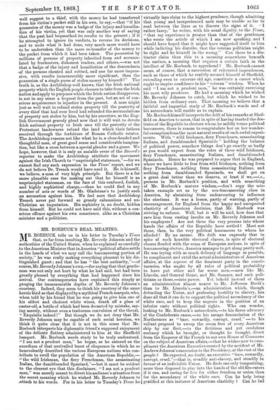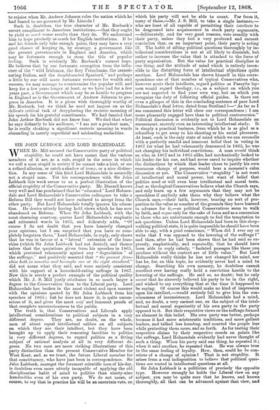MR. ROEBUCK'S REAL MEANING.
MR. T R. ROEBUCK tells us in his letter to Tuesday's imes that, so far from insulting Mr. Reverdy Johnson and the -authorities of the United States, when he explained so carefully .to the American Minister that in America "political affairs settle in the hands of what we may call the buccaneering portion of society," he was really making everything pleasant to his dis- tinguished guest ; and that he has " the best authority,"—of -course, Mr. ReverdyJohnson's own,—for saying that that gentle- man was not only not hurt by what he had said, but had been greatly pleased by everything that had happened since his arrival. Our contemporaries have explained this simply as gauging the immeasurable depths of Mr. Reverdy Johnson's -courtesy. Indeed, they seem to think his courtesy of the same heroic kind as that displayed by a mythical French marquis, who, when told by his friend that he was going to give him one of his oldest and choicest white wines, drank off a glass of -castor-oil, a bottle of which had been decanted by mistake, say- ing merely, without even a traitorous convulsion of the throat, " Exquisite indeed !" But though we do not deny that Mr. Reverdy Johnson may be capable of such social heroism, we think it quite clear that it is not in this sense that Mr. Roebuck interprets his diplomatic friend's supposed enjoyment uf the delicate flattery administered to him at the Sheffield banquet. Mr. Roebuck needs study to be truly understood. "I am not a prudent man," he began, as he entered on the exordium of that unrivalled burst of eloquence in which he so benevolently described the various European nations who con- tribute to swell the population of the American Republic,- • " the wild Irishman, the fiery Frenchman, the assassinating -Italian, the dumbfounded Spaniard,"—but it must be evident to the clearest eye that this disclaimer, "I am not a prudent man," was merely meant to divert his audience's attention from the secret meaning which he wished Mr. Reverdy Johnson to .attach to his words. For in his letter to Tuesday's Times he virtually lays claim to the highest prudence, though admitting that young and inexperienced men may be unable so far to read between the lines as to discern the signs of it. I rather fancy," he writes, with his usual dignity, to the Times, " that my experience is greater than that of the gentleman who wrote the article of which I am now speaking, and I should have hoped that it might have suggested itself to him while indicting his diatribe, that the veteran politician might be right and he himself in the wrong." Can there be a dis- tincter claim than this to a meaning somewhere beneath the surface, a meaning that requires a certain faith in the intellect of Mr. Roebuck, to apprehend ? Mr. Roebuck cannot mean, of course, that a succession of reiterated imprudences, such as those of which he craftily accused himself at Sheffield, extending even to extreme old age, constitute a career which ought to inspire confidence in his "veteran " wisdom. When he said "I am not a prudent man," he was certainly exercising his most wily prudence. He had a meaning which he wished Mr. Reverdy Johnson to catch, but which he wished to be hidden from ordinary ears. That meaning we believe that a faithful and impartial study of Mr. Roebuck's words and of his antecedents will enable us to explain.
Mr. Roebuck himself interprets the drift of his remarks at Shef- field on America to mean, that in spite of having trusted the des- tinies of the Republic to electors whom he mildly terms political buccaneers, there is reason to congratulate her on her wonder- ful exemption from the most natural results of such awful experi- ments. With " wild Irishmen, fiery Frenchmen, assassinating Italians, and dumbfounded Spaniards " holding the balance of political power, somehow things don't go exactly as badly as you would expect from the votes of these wild Irishmen, fiery Frenchmen, assassinating Italians, and dumbfounded Spaniards. Hence he was prepared to argue that in England, where we have little to fear from wild Irishmen, nothing from fiery Frenchmen, nothing from assassinating Italians, and nothing from dumbfounded Spaniards, we shall get on a great deal better than we deserve, at least if we,—i.e., persons in Mr. Roebuck's position, and with something of Mr. Roebuck's mature wisdom,—don't copy the mis- taken example set us by the non-buccaneering class in America, by abstaining from endeavouring to influence the elections. It was a lesson, partly of warning, partly of encouragement, for England from the happy and unexpected elasticity of American destinies, that Mr. Roebuck was striving to enforce. Well, but it will be said, how does that save him from casting insults on Mr. Reverdy Johnson and his employers ? Are not these the very persons into whose hands the affairs of the Republic have settled? Must not these, then, be the very political buccaneers to whom he alluded ? By no means. His drift was expressly that in spite of such horrible electoral classes, in spite of electoral classes flooded with the scum of European nations, in spite of buccaneering electors, America manages to get along pretty well. He was trying with as much delicacy of language as possible, to compliment and extol the actual administrators of American affairs, at the expense of the dominant party in the consti- tuencies, who ought by all rules of political probability to have put other and far worse men,—men like Mr. Lincoln, and General Grant, and Mr. Sumner, and such poli- ticians as those,—into power. Yet behold instead of them an administration almost nearer to Mr. Jefferson Davie's than to Mr. Lincoln's,—an administration which, though defending the Union, and professing hostility to slavery, has done all that it can do to support the political ascendancy of the white race, and to keep the negroes in the position of an inferior caste without political rights. Who can wonder, looking to Mr. Roebuck's antecedents,—to his fierce advocacy of the Confederate cause,—to his savage denunciation of the Northerners as " base, cowardly, corrupt, cruel," — to his valiant proposal to sweep the ocean free of every American ship by our fleet,—to the fictitious and yet credulous embassy which he brought, or thought he brought, direct from the Emperor of the French to our own House of Commons on the subject of American affairs,—that he wishes now to com- pliment the American Executive created by the accident of Mr. AndrewJohnson's succession to the Presidency, at the cost of the people ? He expected, no doubt, an executive "base, cowardly, corrupt, cruel,"—that is, steadily anti-slavery, and steadily in favour of an indivisible Union. He finds one only temporizing, more than disposed to play into the hands of the old fire-eaters if it can, and caring far less for either freedom or union than for the ascendancy of the white race. Can he help being gratified at this instance of American elasticity ? Can he fail to rejoice when Mr. Andrew Johnson rules the nation which he had feared to see governed by Mr. Lincoln ?
Such is, doubtless, the true character of Mr. Roebuck's covert compliment to American institutions,—that they ought to yield so much worse results than they do. We understand him to hope precisely as much for English institutions. If he and his friends only take enough pains, they may have a very good chance of keeping in, by strategy, a government like the present governments in England and America, which may be fortunate enough to stem the tide of popular feeling. Such is evidently Mr. Roebuck's earnest hope. He believes that by our fortunate exemption from the influ- ence of the " wild Irishman, the fiery Frenchman, the assassi- nating Italian, and the dumbfounded Spaniard," and perhaps a little by our still more fortunate reverence for wealth and success, we may manage to countermine the popular will, and keep for a few years longer at least, as we have had for a few years past, a Government which may be as hostile to progress in England as is the Government of Andrew Johnson to pro- gress in America. It is a pious wish thoroughly worthy of Mr. Roebuck, but we think he need not impose on us the delicate critical task of decyphering the esoteric meaning of his speech for his grateful constituents. We had fancied that John Arthur Roebuck did not know fear. We find that when he says defiantly to his audience, " I am not a prudent man," he is really cloaking a significant esoteric meaning in words abounding in merely superficial and misleading audacities.































 Previous page
Previous page